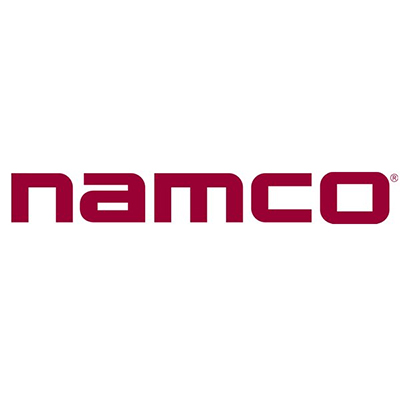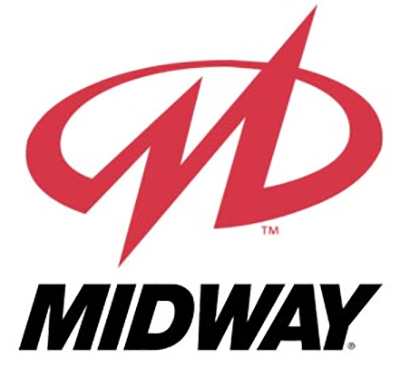
Namco Limited
Namco Limited is a brand and corporate name used from 1971 to 2018 by two Japanese companies in the businesses of video games, game centers and theme parks. The name continues to be used outside of Japan by the subsidiary Namco USA.
The original Namco Ltd. was founded in 1955 as Nakamura Seisakusho and changed its name to Nakamura Manufacturing in 1959. In 1971, Nakamura Manufacturing launched the Namco brand which became the company's name in 1977. In 2006, Namco absorbed the video game division of its sister company Bandai and formally renamed itself Namco Bandai Games. The same day, its existing amusement division split to form a new company called Namco Ltd which was subsequently renamed Bandai Namco Amusement Inc. in 2018.
Namco was a front-runner during the golden age of arcade video games. Pac-Man went on to become the best-selling arcade game in history and an international popular culture icon. Namco is also known for creating successful franchises such as Galaxian, Dig Dug, Xevious, Ridge Racer, Tekken, Ace Combat, Soulcalibur and Tales.
Midway
Midway Games Inc. (formerly Midway Manufacturing and commonly known as Midway) was an American video game developer and publisher. Midway's franchises included Mortal Kombat, Rampage, Spy Hunter, NBA Jam, Cruis'n, and NFL Blitz. Midway also acquired the rights to video games that were originally developed by Williams Electronics and Atari Games, such as Defender, Joust, Robotron 2084, Gauntlet, and the Rush series.
The company's predecessor Midway Manufacturing was founded in 1958, as an amusement game manufacturer. In 1973 it moved into the interactive entertainment industry, developing and publishing arcade video games. The company scored its first mainstream hit with the U.S. distribution of Space Invaders in 1978. Midway was purchased and re-incorporated in 1988 by WMS Industries Inc. After years as a leader in the arcade segment, Midway moved into the growing home video game market beginning in 1996, the same year that it made its initial public offering of stock. In 1998 WMS spun off its remaining shares of Midway. Midway was ranked the fourth largest-selling video game publisher in 2000.
After 2000, Midway continued to develop and publish video games for home and handheld video game machines, but it experienced large annual net losses and engaged in a series of stock and debt offerings and other financings and borrowings. Sumner Redstone, the head of Viacom/CBS Corporation, increased his stake in Midway from about 15%, in 1998, to about 87% by the end of 2007. In December 2008, Redstone sold all his stock and $70 million of Midway debt to Mark Thomas, a private investor, for $100,000.
In February 2009, Midway Games filed in Delaware for bankruptcy. Warner Bros. purchased most of Midway's assets (including Mortal Kombat), and Midway settled with Mark Thomas to relinquish his Midway stock and debt. The U.S. District Court in Chicago dismissed a lawsuit alleging that former officers of Midway misled shareholders while selling their own stock. In 2010, the bankruptcy court dismissed claims against Redstone concerning his sale of the company to Thomas and approved Midway's plan of liquidation. Midway terminated the public registration of its securities in June 2010.


Bally Manufacturing
Bally Manufacturing, later renamed Bally Entertainment, was an American company that began as a pinball and slot machine manufacturer, and later expanded into casinos, video games, health clubs, and theme parks. It was acquired by Hilton Hotels in 1995. Its brand name is still used by several businesses previously linked to Bally Manufacturing, most notably Bally Technologies.
WMS Industries
WMS Industries, Inc. is an American electronic gaming and amusement manufacturer in Enterprise, Nevada. WMS traces its roots to 1943, to the Williams Manufacturing Company, founded by Harry E. Williams. However, the company that became WMS Industries was formally founded in 1974 as Williams Electronics, Inc.
Williams initially was a manufacturer of pinball machines. In 1964, Williams was acquired by jukebox manufacturer Seeburg Corp. and reorganized as Williams Electronics Manufacturing Division. In 1973, the company branched out into the coin-operated arcade video game market with its Pong clone Paddle Ball, eventually creating a number of video game classics, including Defender and Robotron: 2084. In 1974, Williams Electronics, Inc. was incorporated as a wholly owned subsidiary of Seeburg. Williams Electronics was sold as an independent company during the bankruptcy of Seeburg in 1980.
In 1987, Williams changed its parent name to WMS Industries, Inc. when it made its public offering. WMS is a shortening of Williams, which it also selected for its NYSE ticker symbol. In 1988, it acquired competitor Bally/Midway, which it spun off in 1998, together with its video game business. WMS entered the reel-spinning slot machine market in 1994. It closed its pinball division in 1999.
In 2013, WMS became a wholly owned subsidiary of Scientific Games. In 2016, WMS was reorganized and fully merged into Scientific Games. Today, WMS is a brand of Scientific Games, along with SG, Bally and Shuffle Master.


Atari Corporation
Atari SA is a French corporate and brand name owned by several entities since its inception in 1972, currently by Atari Interactive, a subsidiary of the French publisher Atari, SA. The original Atari, Inc., founded in Sunnyvale, California in 1972 by Nolan Bushnell and Ted Dabney, was a pioneer in arcade games, home video game consoles, and home computers. The company's products, such as Pong and the Atari 2600, helped define the electronic entertainment industry from the 1970s to the mid-1980s.
In 1984, as a result of the video game crash of 1983, the original Atari Inc. was split, and the arcade division was turned into Atari Games Inc. Atari Games received the rights to use the logo and brand name with appended text "Games" on arcade games, as well as rights to the original 1972–1984 arcade hardware properties. The Atari Consumer Electronics Division properties were in turn sold to Jack Tramiel's Tramel Technology Ltd., which then renamed itself to Atari Corporation. In 1996, Atari Corporation reverse-merged with disk-drive manufacturer JT Storage (JTS), becoming a division within the company. In 1998, Hasbro Interactive acquired all Atari Corporation related properties from JTS, creating a new subsidiary, Atari Interactive.
Infogrames Entertainment (IESA) bought Hasbro Interactive in 2001 and renamed it Infogrames Interactive, which intermittently published Atari branded titles. In 2003, it renamed the division Atari Interactive. Another IESA division, Infogrames Inc. (formerly GT Interactive), changed its name to Atari Inc. the same year, licensing the Atari name and logo from its fellow subsidiary.
In 2008, IESA completed its acquisition of Atari, Inc.'s outstanding stock, making it a wholly owned subsidiary. IESA renamed itself Atari, SA in 2009. It sought bankruptcy protection under French law in January 2013.
Other Game Companies
Innerprise, Grandslam, Quicksilva, Thunder Mountain, and INTV all developed ports of Pac games for the home systems. Virtuality made the VR game. Digital Eclipse is either the same as Innerprise, or they're theives. Atried Concept and Mindscape developed the worst Pac-man game ever. Coleco, Mattel, Amstrad, Commodore, Sinclair, Texas Instruments, IBM, Apple, Philips, Microsoft, Nintendo, Sega, and Sony all had Pac-man released for their game and computer systems.
